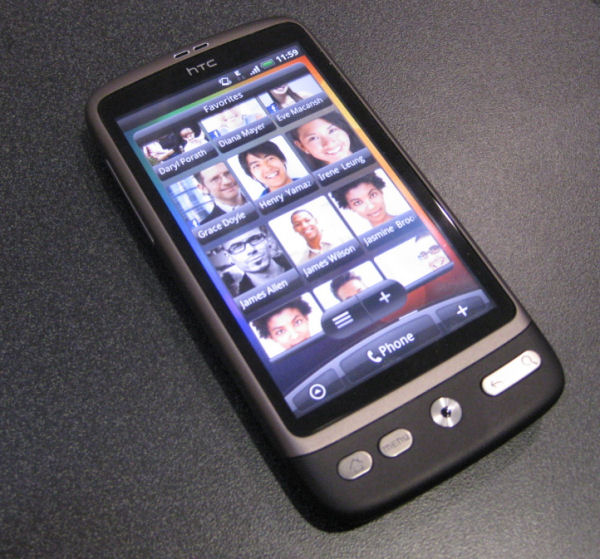
Hello? Facebook login! Hello? Where are my piggies?
In an astonishing statistic released this morning, Web analytics service Experian Hitwise reported that of all the Web searches performed in the United States on the top three search engines Google, Yahoo, and Bing during the first four weeks of March, about two percent on average are for the word facebook. For Yahoo and Bing, Another one percent is for facebook.com, and just less than one percent is for facebook login.
Coupled with statistics for the same month from analytics service comScore, Experian's findings suggest that, from March 1 through March 27, searches for a way to get to Facebook other than through typing the address or clicking on a bookmark, accounted for as many as 175.84 million Google searches in the US, over 78.9 million Yahoo searches, and over 80 million Bing searches.

No, Microsoft did not say Android steps on its IP
A spokesperson for Microsoft's legal department confirmed to Betanews this afternoon that a precise legal interpretation of the company's patent agreement announced late yesterday with phone maker HTC is accurate, but interpretations of that announcement that imply Microsoft will charge royalties to HTC for its use of the Android operating system, are inaccurate.
"This agreement covers HTC's use of Microsoft technology that may appear in Android," the spokesperson told Betanews, affirming a specific interpretation of the language that we sought clarification on. As the announcement reads, "Microsoft Corp. and HTC Corp. have signed a patent agreement that provides broad coverage under Microsoft's patent portfolio for HTC's mobile phones running the Android mobile platform. Under the terms of the agreement, Microsoft will receive royalties from HTC." (emphasis ours)

New hope for free encoding in Blu-ray videos with x264
The problem for independent video producers and enthusiasts has been the inability to encode videos that can be burned to Blu-ray Discs, and then actually played on BD consoles. That changed yesterday as Jason Garrett-Glaser, the leader of the open source x264 project that has seen success with DVDs, announced his team was able to encode a playable Blu-ray video using entirely free software.
That disc is being released as a kind of "Hello, World" effort for the high-definition format. It contains free videos folks have probably seen before, such as the Creative Commons licensed cartoon "Big Buck Bunny." But the image was designed to be small enough (2 GB) to be burned to either a DVD or a BD, to further prove the software's versatility.

Sen. Schumer suggests FTC take charge of Facebook's, others' privacy policies
Amid news yesterday of a discovery by an independent programmer of what appeared to be another door left open for Web apps to access Facebook users' personal data, Sen. Chuck Schumer (D - N.Y.) called upon the Federal Trade Commission to take the next step in forming the equivalent of a US "privacy commissioner."
It was the first step in a one-two punch, as Sen. Schumer later joined three other Democrat senators in penning a letter to Facebook CEO Mark Zuckerberg, calling upon him to make his site's privacy policy clearer and tighter, in order to give the FTC less to scrutinize.

First genuine BlackBerry OS 6.0 info shows new media player, browser
Research In Motion could deliver sixteen completely new smartphones with built-in telekinesis amplifiers, but it would not satisfy the legions of BlackBerry users who depend on its reliable messaging ability, who need a real Web browser that shows real Web pages, and who would appreciate a media player that doesn't look ported from a Commodore 64.
Why RIM officials can't just deliver the news to WES conference attendees directly is puzzling, but during this second day of the three-day event, the Day 2 keynote offers RIM users a two-minute quick-cut video of BlackBerry OS 6.0, alongside a parade of new enterprise apps. Granted, enterprise apps are important, but what BlackBerry has been lacking this past year is a proper platform for them.

Silverlight revolutionizes beta of next Windows Home Server
Make your connection to Microsoft Windows Home Server "Vail" Public Beta through Fileforum now.
One of Silverlight video's biggest advantages to date has been the server's ability to tweak the bitrate of video playback as it's being played back, and as the bandwidth of the connection varies. It's the smooth streaming feature that premiered last June with Silverlight 3. Now, with Silverlight 4 already well under way, Microsoft today premiered a public beta of a forthcoming release of Windows Home Server, which will be capable of smooth-streaming video to any Silverlight-enhanced client via the Web.

Is there really an iPad interference problem?
A slow, but steadily increasing, trickle of messages on Apple's iPad discussion forums appears to confirm the findings of Princeton University's Network Systems engineers, who dealt this month with a rapid influx of iPads over a concentrated area. What they've been noticing is that Wi-Fi on iPads that are set for dynamic DHCP leases -- assignments of IP addresses to clients for limited time periods -- are failing to renew those leases when time expires, often after just a few hours.
As a result, users' iPads are stuck with the message "Connecting..." and no easy, or apparent, way to renew their network connections. Although Princeton discovered the problem as early as April 4, and Apple forum discussions began April 11, Apple's only suggestion has left some customers struggling.

RIM whets BlackBerry fans' appetites ahead of likely OS 6.0 news
For reasons still being debated in the press, Research In Motion was not the star of the last Mobile World Congress show in February. Evidently something wasn't ready yet. But ahead of a smaller wireless conference in Orlando this week, RIM has plans to own the show.
This morning, the company announced two new models -- not refurbished versions of existing models as some press sources have said, but new chasses with new components...just familiar brands. But spokespersons for the company tossed some bread crumbs that lead in the direction of more announcements, perhaps as soon as this afternoon. Word on the rumored BlackBerry OS 6.0 with a (real) Web browser, may be on the docket.

What if nobody wants Palm?
A process of elimination which has, apparently since February, cast aside a who's-who of possible suitors, has left Lenovo as the only prospective suitor for Palm, Inc. still standing, after everyone else told Reuters no. It could mean Lenovo is genuinely interested, though it could also mean the only ones giving Palm any positive value...are in the press.
The thing about Lenovo is, it already has a smartphone. In fact, it debuted in its home country of China just last Tuesday, and it's no slouch: It has a stupid name -- LePhone -- but it features the astounding 1 GHz Snapdragon processor that's at the heart of HTC's latest models, a widescreen AMOLED display, Wi-Fi, and an eye-catching QWERTY keyboard with the D-pad in the middle. It was running Android 1.6 at CES in January, though reviewers say it should be running Android 2.x today. Arguably, Lenovo already has a phone that could defeat a Palm Pre Plus in a comparison test in its home country. And though analysts have said Palm could give Lenovo an entry point into the US market...wouldn't it be more sensible to enter the market with the phone you're already making?

Is news subject to Apple's developers' agreement?
While bitterness continues over the implications of Sections 3.3.1 through 3.3.3 of Apple's recently modified Developers' Agreement (PDF available here, through the Electronic Frontier Foundation), there's lingering suspicion about the indeterminate boundaries pointed to by the long-standing Section 3.3.14, which now applies to iPad content as well as iPhone.
"Applications may be rejected if they contain content or materials of any kind (text, graphics, images, photographs, sounds, etc.) that in Apple's reasonable judgment may be found objectionable, for example, materials that may be considered obscene, pornographic, or defamatory," the section reads.

One very false positive: McAfee in full damage control mode
Many instances of malware on Windows-based systems masquerade themselves as system services -- the various independent processes that respond to requests from both the operating system and applications with functions that users typically need. Network connectivity and printing are among the more common Windows services; and if you've ever perused the processes list of Task Manager (or, better yet, Process Explorer), you'll find these processes are represented by the single .EXE file that hosts them, svchost.exe.
Any anti-virus database looking for a rogue system service will probably have to refer to svchost.exe as the process that launches it, even though that process is clearly part of Windows itself. On Wednesday, McAfee distributed a .DAT file to many of its enterprise customers that may have had a single faulty character. As a result, their anti-virus systems successfully quarantined not the service launched by svchost.exe, but svchost.exe itself.

Canada will keep an eye on Facebook Platform expansion for privacy
Yesterday's introduction by Facebook CEO Mark Zuckerberg of a vastly expanded form of the Facebook Platform -- enabling Web sites to gather information on users' "likes," share them with Facebook, and get traffic as a result -- did not slip past the office of Canada's Privacy Commissioner, Jennifer Stoddart.
In a statement to Betanews this afternoon, Comm. Stoddart acknowledged this expansion will be of special concern to her office, especially in light of existing concerns raised by the service's latest round of privacy policy adjustments. Some say those adjustments actually exposed more information to potential data miners than it was exposing before, leading them to question the company's motives for attaining that data in the first place.

A broadband plan of sorts goes forth, with muted net neutrality
The strategy being employed by the Federal Communications Commission, as put forth yesterday, is to treat its loss to Comcast in DC Circuit Court two weeks ago not as a defeat of its ability to implement the entire Broadband Plan...and then hope that no one puts up any new roadblocks toward deploying at least most of it.
The priorities the FCC put forth during yesterday's open hearing are perhaps the ones that would generate the least friction from possible opponents. One of these priorities is reflected in a major rule change yesterday with respect to what regulators originally thought should be an oxymoron: home roaming.

With Microsoft's and Google's help, Facebook assembles, like, a platform
At its f8 developers' conference in San Francisco this morning, Facebook CEO Mark Zuckerberg presented his vision of a cross-site social platform whose developmental state may already be quite far along. Essentially, he sees a kind of online social sphere wherein anything one communicates that he likes, gets channeled to Facebook, where that like becomes a public fact.
"Today, the Web exists mostly as a series of unstructured links between pages. And this has been a powerful model, but it's really just the start," said Zuckerberg. "The Open Graph puts people at the center of the Web. It means that the Web can become a set of personally and semantically meaningful connections between people and things. I am friends with you. I am attending this event. I like this band. These connections aren't just happening on Facebook, they're happening all over the Web. And today, with the Open Graph, we're going to bring all of these together."

Latest ACTA draft finally released, ISP 'safe harbor' limitations considered
As promised, the world's trade negotiators have finally released a public and, to a limited extent, redacted version of the current draft document for the Anti-Counterfeiting Trade Agreement. Releasing a draft of a global trade agreement is actually unprecedented, say many diplomats.
Though the authors of certain passages under consideration -- many of them marked by [square brackets] -- have been redacted from public view, it's clear that new legal limitations on an Internet service provider's ability to claim "safe harbor," excusing it from secondary liability for copyright (or patent) infringement, are being considered. That option is believed to have been proposed by the United States delegation, as indicated by a leaked document from the European Union (PDF available here from Wired). However, another option that would not limit ISP safe harbor provisions, is listed in the draft document under equal consideration.

